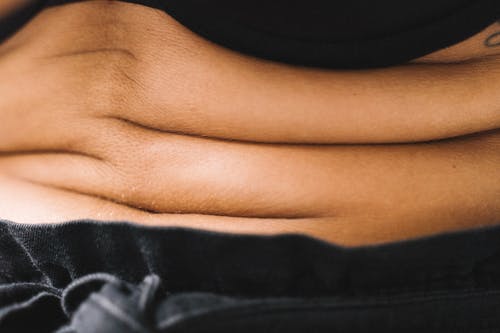Yes, you read that correctly.
As terrible as living with anorexia nervosa was there were parts of it that were not all bad.
I am certain that if you ask anyone who’s recovered from anorexia nervosa or any of the other myriad manifestations eating disorders take if there are things, they miss about the eating disorder they will say yes. That is if they are completely recovered and completely honest.
Before we dive into what 3 of the most common things people say they miss about their eating disorder are, I’d like to preface this post with the most important thing you need to know. That just because you can recognise that there were certain functions or “pros” to living with the eating disorder that you no longer have when you are recovered what you have in recovery far outweighs all of these “pros” combined.
In your fully recovered life going back to the eating disorder in order to gain these things back isn’t even a consideration.
The trade-off between what you get in recovered life versus what you got in sick life are incomparable.
Interestingly, I have over time come to wholeheartedly believe it would no longer be possible for me to go back to the eating disorder. Even if I were to try my hardest to do so.
Which is the strangest realisation given that anorexia was the dominant force running my entire life for around 15 years and everything I did was an attempt to be free from it. It was never a choice to have it and it is now interestingly not a choice to not have it. That is the definition of transformation, a change with is complete and sustained without ongoing conscious effort (caveat: I did a lot of conscious and unconscious work to get to this point where recovered is my normal it doesn’t just happen by chance).
3 Commonly Missed Things About Living with An Eating Disorder
- My Body

Yeah, that body I despised. That body I hated so much. That body I largely ignored. That body I ran into the ground day after day. Yup, I miss that body.
For perhaps the majority of the time I lived with anorexia nervosa my body was underweight, but and this is an important but, it was not underweight in a way that looked overtly outwardly “sick.”
It was small, slim, and sadly pretty stereotypically desirable by the standards of the society of which I was (am) a part.
People far more often complimented me on the size and shape of my body and how “healthy” I was versus expressed concern.
At the time I despised the “healthy” compliments because they frustrated me, they made me mad, they made me sad, and they fuelled a shame of my body that was pervasive.
I honestly didn’t know until that body was no longer an option that I also enjoyed that body. Why? I can’t really say, perhaps because it made me slightly different.
I was always just a bit smaller than others, just a bit lighter, just a bit finer, just a bit more petite, neat, pretty, dainty… All the words you can think of that have been used to describe smaller bodies as we signify them as being more pleasing than larger bodies.
However, what I really was, was none of these things.
I was just sick.
In that body I had such monumental trouble gaining weight. Sometimes I hated this and sometimes I loved it.
I didn’t know anyone else who struggled with gaining weight or even maintaining weight. The opposite is far more widespread and accepted. This made me different which gave me a sense of significance. A sense of significance I didn’t consciously know and would have denied if I had out of despising valuing such a thing but a sense of significance is a sense of significance none the less and at an unconscious level significance is an unavoidable human need (If you want to have a read of an earlier blog I wrote on the “human givens” or “human needs” The 11 Needs You Probably Didn’t Know You Have and What to Do Now You Do. This will help you to understand why this sense of significance and 10 other needs we all have are not something we can logic our way out of).
Why I Don’t Miss That Body
I cannot tell you how wonderful it is to see my body, to feel my body, to know my body.
I cannot tell you how wonderful it is to have fat and muscle over your bones when you are trying to sleep, when you are making love, when you are sitting in a hard chair for hours, when you are choosing clothes to wear and so on and so forth but the main reason, I love my larger body is because of the brain that goes with it.
A brain that, as much as I’d wanted to believe otherwise, just wasn’t possible to fully cultivate in that smaller body.
I can honestly say as I sit here in bed writing this blog for you that I love my body.
It’s not something I even think about to be honest.
I simply know it to be true.
I don’t love my body because of the way my body looks or even the things my body allows me to do and experience.
It just is. I love my body. It’s a given, a non-negotiable.
I love my body unconditionally.
I am now four days post an operation to remove some potentially precancerous cells from my cervix. I’ve been lying in bed for the vast majority of those 4 days and doing not much beyond getting up to eat every now and then, reading and listening to online trainings and I love my body. I’ve had chocolate, ice-cream, smoothies, potato bake, peanut butter toast, granola and all sorts of things I’d previously not have allowed myself if I was just in bed all day. That I’d have not allowed myself full stop.
I trust my body unconditionally that it can tell me what it wants. A place I never imagined I’d ever be and a place I now wouldn’t trade for the world.
I don’t miss that body because it wasn’t my body.
2. Eating

Oh wow if I could only tell you how good it felt.
When you are starving, and you give yourself “permission” to eat the emotions of eating are phenomenal.
The sense of elation is out of this world especially if it is something you don’t allow yourself to eat often (or at all).
After days, weeks, months or even years of eating majority fruits, vegetables and plain grains the pleasure of eating something like pasta with a rich cream sauce, a milk-based smoothie, ice-cream or chocolate cake is indescribable.
The depth of flavour, lushness and desire to eat and eat and eat and not stop was all consuming and something I got a lot of pleasure out of when I was sick.
It was the only time I enjoyed food (I hated it at the same time and hated myself at the same time, but it was the only time I got any enjoyment from food).
Even the empty promises that at the next meal you’re going to eat as much as you like of whatever you like are intoxicating.
Food just doesn’t taste good to that level in a fully recovered life and it becomes far less interesting and emotional. Which is understandable but it’s also a paradox because of course one of the wants in illness is to recover in order to be able to “enjoy” food which leads us to…
Why I Don’t Miss That Eating
I don’t miss that eating because it was exhausting!
I don’t miss that eating because it was all consuming.
I don’t miss that eating because in the moments between that eating I was so starved and malnourished that sometimes it was hard to walk or even, no joke focus my eyes (let alone make friends, connect with loved ones and enjoy life).
I don’t miss that eating because it took so much planning, so much preparation, so time and often resulted in so much let down and disappointment because the people I wanted to eat with couldn’t make it, pulled out last second, I ended up not being able to eat the food, were already full from some other meal, couldn’t eat as much as I would have liked to (and there was no way I could eat more than them) and endless other reasons.
I don’t miss that eating because it was always in a supervised, tightly controlled environment riddled with shame, guilt, frustration and a healthy dose of self-loathing.
I don’t miss that eating because it had 1001 conditions. It felt like I had to get it “perfect” but perfect was entirely beyond reach.
Above all I don’t miss that way of eating because any feeling of enjoyment was very unstable and only ever fleeting.
While I did get a lot of pleasure out of eating when I was sick the pleasure was far outweighed by the fear, the pain, the shame and the unrelenting inner turmoil that came with thinking about it, preparing it and every mouthful of consuming it.
I don’t miss that.
While I may not now derive the same intense level of perverse pleasure, I also don’t have the guilt and self-loathing.
I enjoy food and that is enough.
More than enough.
I don’t miss that way of eating because for the most part it wasn’t real.
3. Making Decisions

When I lived with anorexia nervosa it was as if every decision was pre-decided for me.
Which made things simple.
Making decisions can be quite hard. It’s a lot of responsibility and you never know just how much each of those decisions if made wrong could stuff up your entire life right? (at least that is what it can feel like at the time).
I’ve become much better at it the more I’ve become certain on who I am and what I want but initially it was so hard to know what was the “right” decision and even the smallest decision was painful.
When I was sick, I knew that if someone asked me to meet them for lunch, dinner, coffee or just to hang out my reaction would be no, that it was going to interfere with this or that (I never consciously thought about the food factor, my mind came up with all sorts of excuses to not go that didn’t even have to touch on food).
I would often struggle or try to go against the feeling of dread, but I knew in my gut what the decision was. I knew what my reaction and response would be so in a way it gave me a sense of certainty (see my earlier post on the 11 “human needs” The 11 Needs You Probably Didn’t Know You Have and What to do Now You Do to understand why a sense of certainty is important).
Other people close to me in my life also learned to treat me in a very predicable way. They “knew” there were things I could and couldn’t do to the point where they’d stop asking me to do something I’d said no to a couple of times. They accommodated the illness because it was easier and simply because that is what happens naturally in life, people change how they treat us based on how we behave and how we treat ourselves. This is normal. It is also one of the (many) things that make recovery hard though given that recovery is the effort to do different and be different and if everyone is treating you as though you are still sick when you are entering a new life where you are no longer sick this can really be confusing. It’s easier to just go with the decision to continue to do things the way you always have but remember if you do what you’ve always done you’ll get more of what you’ve always gotten.
Why I Don’t Miss That Way of Making Decisions
I don’t miss that way of making decisions because it wasn’t making decisions, it was being ordered.
I don’t miss that way of making decisions because now I get to make decisions that come from me!
Being able to make decisions about your life is a responsibility but it is also the ultimate freedom.
Take Home Tip Bits

If you’re worried on any level that you may miss the 3 things I’ve listed here (or any number of others) when you recover from you eating disorder and that is in any way, shape or form contributing to your hesitation to recover fully please trust me (and the millions of other people who’ve recovered) when I say all of those things you find joy/peace/pleasure/comfort/safety in now and seem so important aren’t.
They just aren’t.
They are nothing compared to the depth and richness of life you will experience when you let them go.
Recovered is, in every sense of the term “worth it.” The hard part is that the time when you must do the hard things and the time you feel it is worth it are not one and the same. The sense of “worth it” is drastically delayed.
Which, if you think about it, just makes it even more worth it.
What would make recovery “worth it” to you?
With my whole heart I hope you found this information useful and inspiring.

Become Great. Live Great.
Bonnie.




2 thoughts on “The Paradox: 3 Things I Miss About Anorexia”
hi
yes
i miss the discipline to be honest
the hardcore strength and discipline
i miss the discipline and focus. at that time where i went too far
i played national league hockey and it perhaps robbed me of going further
i dont miss the stigma and misunderstanding
its there now.
i dont miss the fa t its grossly misunderstood and nothing to do with being vain or attention seeking.
Thanks for sharing parts of your story Anna. It’s always appreciated.